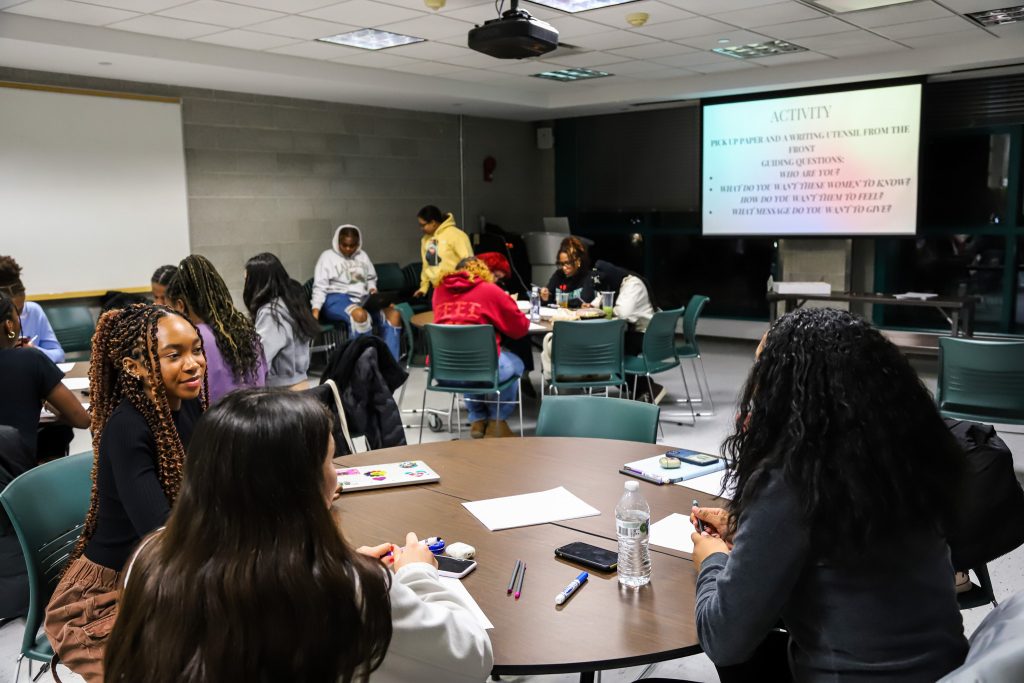Powerful United Ladies Striving to Elevate (PULSE) held a letter writing event in support of incarcerated women.
On Tuesday, March 7, PULSE — a community organization that works to empower women with a focus on intersectionality — hosted “Letters to Incarcerated Women” in the Binghamton University Union. Participants had the opportunity to write messages to women currently incarcerated in Broome County in order to “remind incarcerated women of their value and encourage them to look forward to life outside the system,” according to an Instagram post by the organization. This event was part of their larger PULSE month initiative, which aims to “empower women of color” throughout March — International Women’s Month.
The event began with a speech from Karen Alburquerque, the vice president of PULSE and a senior double-majoring in biology and Korean studies. She emphasized the racial implications of social injustice within the legal system and the obstacles put in place to prevent people from corresponding with those incarcerated in Broome County.
“Broome County itself has the highest incarceration rate in New York state with its disproportionate outcomes affecting the Black community and other communities of color including women,” Alburquerque said. “The institution of Broome County’s carceral system has left us unable to send letters to these women without jumping through hoops, so we hope to work with an organization in the area that works with incarcerated and formerly incarcerated women from the prison system.”
In 2021, The Vera Institute — a nonprofit that researches solutions to end mass incarceration — released a report on the size and demographics of Broome County’s jail population. The report stated that, in 2020, “among New York City and the 57 counties outside the city, Broome County had the second highest incarceration rate.” The document also stated that, in June of 2020, Black residents made up 42 percent of those in jail in Broome County, despite comprising about 6.2 percent of its population.
According to Alburquerque, women with intersectional identities are most impacted by inequality and prejudice within the justice system.
“Women of color’s presence in the prison system [has] increased heavily in recent years affecting the likes of Black women, Indigenous women, trans women and much more,” Alburquerque wrote. “The intersections of their identities have left them most vulnerable.”
On March 1, The Prison Policy Initiative, a thinktank that advocates against mass incarceration, released a report on women’s incarceration in 2023. The report cited a 2017 study that demonstrated inconsistencies in the sentencing of women who identify as lesbian or bisexual, with such women being more likely to receive longer sentences and more likely to be placed in solitary confinement than those who identify as heterosexual.
The report acknowledged the overrepresentation of Black and Indigenous women in prisons and jails. Based on this data, the Initiative concluded that “while we are a long way from having data on intersectional impacts of sexuality and race or ethnicity on women’s likelihood of incarceration, it is clear that Black and lesbian or bisexual women and girls are disproportionately subject to incarceration.”
After participants had written their letters, they read positive affirmations together. The meeting was then concluded with a quote from Leslie Littlejohn, executive director of Girls on the Run of Central Oklahoma, who said, “fix another woman’s crown without telling the world that it is crooked.”
Alburquerque said a future goal of PULSE is to work with “Walk With Me,” a program that provides critical services to those leaving Broome County Jail — such as housing, support groups, peer advocacy and mentoring. She explained the importance of reaching out and encouraging women who are or have been incarcerated.
“We hope to share that their reality cannot be defined by a system that was meant to disservice them as that is not their story,” Alburquerque wrote in an email. “Though the fight still remains a long road ahead, mass incarceration is not something that can continue if the situation and systems around it are destroyed. But until that happens they need to remember to stay headstrong and education and elevation are the only way to uplift themselves and others in their situation whether that be incarcerated or formerly incarcerated.”
Genesis Hernandez, the treasurer of PULSE and a senior majoring in philosophy, politics and law, described the effect she hopes her letter has.
“Writing letters to incarcerated women allowed me to give other women words of encouragement that often gave me solace in times of adversity and hardship,” Hernandez wrote. “I hope that these words stick with them and have an impact on them as much as it did me!”
Each week in March, PULSE’s events will be catered to a specific theme — such as women’s health and reproductive rights, intersectionality and feminism, empowering women of color and women in STEM. Along with these meetings, collaborations and community service and fundraising projects, PULSE will be highlighting revolutionary women in history on their Instagram.



